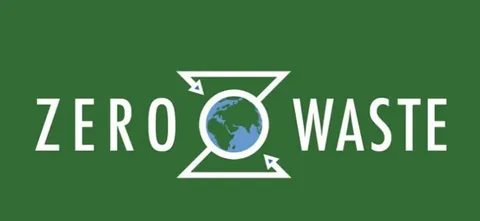Zero-waste living, a lifestyle that minimizes waste generation through conscious choices, is rapidly gaining traction in India as the country embraces more sustainable practices. As part of global efforts to reduce environmental damage, the Indian government and communities are playing a crucial role in promoting this eco-friendly way of life. By 2024, zero-waste living is more than a trend—it is a movement toward a cleaner, greener India.
Understanding Zero-Waste Living
At its core, zero-waste living involves reducing, reusing, and recycling to minimize the amount of waste sent to landfills. It encompasses daily choices such as using reusable bags, containers, and bottles, avoiding single-use plastics, composting organic waste, and supporting products with minimal or eco-friendly packaging
The aim is not to eliminate waste entirely but to minimize it as much as possible, making conscious decisions about consumption and disposal.
In India, where over 159,000 tonnes of waste are generated daily
Press Information Bureau, zero-waste living has become vital for managing waste efficiently. The movement is fueled by the recognition that waste not only harms the environment but also depletes resources and impacts public health.
Sustainable Communities Leading the Charge
Several housing societies and communities in India have emerged as leaders in the zero-waste movement. For example, the Seawood Estate NRI Cooperative Housing Society in Navi Mumbai processes its wet waste on-site, converting it into compost and using it to maintain their green spaces
Press Information Bureau. Similarly, HSR Layout in Bangalore practices extensive waste segregation, ensuring that 80% of waste generated is processed effectively
In addition to urban centers, rural India is also embracing zero-waste principles. The Swachh Bharat Mission, a nationwide cleanliness initiative, has inspired villages to implement waste segregation, composting, and water management systems. These rural efforts are helping to mitigate the environmental impact of waste while promoting sustainable living practices
Practical Steps for Adopting Zero-Waste Living
For individuals and communities looking to adopt a zero-waste lifestyle, there are several practical steps that can make a significant difference:
- Composting Organic Waste: One of the most effective ways to reduce waste is by composting organic materials like food scraps and garden waste. Composting turns these items into nutrient-rich soil, reducing the amount of waste sent to landfills.
- Using Reusable Products: Swapping single-use items like plastic bags, straws, and water bottles for reusable alternatives is a simple yet impactful step. Reusable products help reduce plastic pollution and lower the demand for disposable items
- Supporting Sustainable Packaging: Packaging waste is a major contributor to environmental pollution. By choosing products with minimal or biodegradable packaging and supporting brands that prioritize sustainable materials, consumers can help reduce their ecological footprint
- Minimalism: Owning fewer, higher-quality items is a key principle of zero-waste living. Minimalism promotes buying only what is necessary and choosing durable goods that last longer, thereby reducing waste over time.
- Water Conservation: Reducing water usage is another important aspect of sustainable living. Rainwater harvesting, fixing leaks, and using water-efficient appliances are effective ways to conserve this precious resource.
Zero-Waste and Health Benefits
Aside from environmental advantages, zero-waste living also offers health benefits. Reducing exposure to plastics and harmful chemicals by using eco-friendly products can improve air and water quality, leading to better overall well-being. Many families who practice zero-waste living also grow their own food, free from pesticides and chemical treatments, contributing to healthier lifestyles
Community Engagement and Policy Reform
Promoting zero-waste living in India requires a collaborative effort that goes beyond individual action. Community-driven initiatives such as clean-up drives, waste management workshops, and composting programs help raise awareness and inspire others to join the movement
Policy reform is also essential to support zero-waste initiatives at a broader level. Advocacy for extended producer responsibility (EPR) laws, which hold manufacturers accountable for the environmental impact of their products, is key to fostering a more circular economy
The Indian government’s initiatives, including the Swachh Bharat Mission and the newly launched Swabhav Swachhata Sanskaar Swachhata (4S) campaign, are making strides in solid and liquid waste management, especially in rural areas
These efforts are complemented by urban programs that encourage housing societies and municipalities to adopt zero-waste practices.
Challenges in Achieving Zero-Waste Living
While zero-waste living is an admirable goal, it comes with its challenges. For many urban dwellers, space constraints and a lack of access to composting facilities can make it difficult to fully embrace this lifestyle. Additionally, the widespread use of plastic packaging in consumer goods remains a significant hurdle.
However, innovative solutions such as community composting centers and eco-conscious startups are helping to address these issues. Local governments are also stepping up, with cities like Bangalore and Mumbai implementing stricter waste segregation and management policies
The Future of Zero-Waste Living in India
Looking ahead, the zero-waste movement in India is poised to grow even stronger. As more people become aware of the environmental and health benefits of reducing waste, the demand for sustainable products and services will continue to rise. The integration of zero-waste principles into everyday life, coupled with government support and community engagement, will play a crucial role in shaping a cleaner and more sustainable India.
Ultimately, zero-waste living is not just a trend—it is a necessary step toward a more sustainable future. By making mindful choices today, we can pave the way for a greener, healthier tomorrow.










